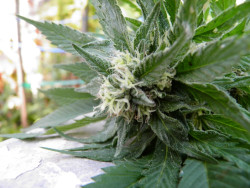Within the almost 2,000 page-long budget just passed by Congress is a provision lifting the ban on medical marijuana at the federal level by discontinuing funding to shut down dispensaries. This follows more than 75 years of growing prohibition policies regulating this extremely useful plant. Now states will have the freedom to allow or disallow people from legally growing, buying and selling medical cannabis. For states where medical cannabis has been decriminalized, such as South Dakota, Minnesota, and South Carolina, we may soon see the rise of dispensaries selling prescription marijuana to people in need of relief. This decision follows a Department of Justice decision in September which decriminalized the cultivation and use of marijuana on Native American Reservations throughout the country. Both of these decisions will have interesting effects on our economy and the lives of low-income people.
Since the early 1990s, when the movement for medical marijuana in the United States began, 23 states have legalized medical marijuana and a total of 36 have changed and adopted laws making some medical marijuana products more available in their states. The concession Congress Republicans made last week in passing this policy was likely an acceptable provision as it came in the same budget as many wins for Republicans and makes the GOP more appealing to pro-marijuana millennial voters. It will be interesting to see how and when medical cannabis will be included in health insurance policies, especially those mandated under the Affordable Care Act.
The people most affected by better access to medical marijuana? The disabled and the diseased. The poverty rate among disabled Americans is 28%. For card-carrying medical marijuana patients, having a pot grower fosters financial savings. Moreover, medical cannabis use can side step pharmaceutical companies whose costs are skyrocketing and are now prescribing to nearly 70% of Americans! Medical marijuana and the decriminalization of cannabis gives not only preventive and restorative healthcare treatment options to those under-insured or unable to use insurance because of cost, but also provides very needed relief to some of the most under-served US populations without growing chemical dependence on pharmaceuticals including pain killers. According to the Center for Disease Control, prescription overuse and abuse has quadrupled since 1999. However, the rise in marijuana dispensaries has already been shown to save lives. A recent study shows medical marijuana dispensaries have lowered opioid-abuse treatment admissions by 28% and opioid-related mortality by 16%.
States where medical marijuana is legalized bordering ones where it is illegal, (such as Texas, bordering Oklahoma) may experience lower costs of medical cannabis in years to come as federal government will no longer be shutting down dispensaries. States such as Oklahoma may still be far away from legalizing its sale and consumption. Conversely, California with legal medical pot bordering Oregon, where all pot is legal, will finally be free to operate dispensaries without the threat of the federal government shutting them down. In California, the trend of prosecuting dispensary operators has closed hundreds of medical dispensaries, limiting access to what the states consider legal healthcare. This is a huge win for healthcare rights especially in states such as California and Michigan where the feds have interfered with dispensary operations.
The lift on this ban means the industry can now operate with more freedom and greater potential for economic gains. Dispensaries working as legal businesses pay taxes, contributing to government revenue instead of draining it, as marijuana ban enforcement has in the past decades. As any other business, they also keep local economies moving. This is a point agreed upon by publications, economists, and organizations on all points of the political spectrum, from The Economist to The New York Times.
The changes in medical marijuana law during the Obama administration have opened up a much greater quality of life for countless Americans. Medical cannabis (at least non psycho-active cannabis) has even been legalized in many red states such as Iowa, Texas, and Alabama. The advent of this ban lift is a powerful step towards a more equitable healthcare system, one that serves people’s needs in a way no legal medicine has done since marijuana was legal in this country prior to 1937. This is a medical access breakthrough which has the great potential to grow strong economic activity in places where it is most needed, as it once did in this country a long time ago.
Also by Alyse: Why Vegans Should Care About Prison Abolition
More news: What You Should Know About Coconut Oil and Animal Exploitation
Get more like this–sign up for our newsletter for exclusive inspirational content!
__
Photo: lemon kush, day 50, top via photopin (license)





